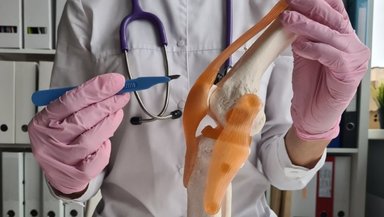How to Prepare Your Body and Home for Hip and Knee Revision Surgery: Tips from Patients

Medicine Made Simple Summary
Hip or knee revision surgery is a major step that requires both physical and mental preparation. Unlike first-time replacements, revision surgeries can be more complex, and recovery can take longer. Patients who prepare their body with exercises, diet, and medical readiness, and their home with safety adjustments, tend to recover more smoothly. This article offers practical tips — drawn from patient experiences — on how to get ready before surgery day. With the right preparation, patients and families can reduce stress and improve recovery outcomes.
Introduction: Why Preparation Is Key
Revision hip or knee surgery is not just another operation; it is often more complicated than the first replacement. This makes preparation critical for ensuring safety, reducing risks, and supporting recovery. Patients who go into surgery prepared — physically, mentally, and environmentally — tend to experience fewer complications and a smoother healing journey.
Preparing Your Body: Medical Readiness
Before revision surgery, doctors usually recommend a full medical evaluation. This includes blood tests, ECG, chest X-ray, and sometimes advanced imaging. Patients with chronic conditions like diabetes, hypertension, or heart disease must ensure these are well-controlled. Stopping smoking, reducing alcohol, and adjusting current medications (like blood thinners) are also crucial steps. Medical optimization lowers the chances of surgical complications and speeds recovery.
Strengthening Muscles Before Surgery
Muscle strength plays a major role in recovery. Patients with stronger thigh, hip, and core muscles regain mobility faster. Pre-surgery physiotherapy, also called ‘prehab,’ involves simple exercises like leg raises, ankle pumps, and chair squats. Even 3–4 weeks of targeted exercise before surgery can significantly improve post-surgery outcomes. Patients often describe prehab as one of the best investments they made in their recovery.
Weight Management and Nutrition
Excess weight puts more stress on joints and increases surgical risks. Patients are encouraged to work on gradual weight reduction if possible. Nutrition is equally important — a protein-rich diet supports muscle healing, calcium and vitamin D strengthen bones, and iron-rich foods reduce the risk of anemia. Staying hydrated and cutting down on processed foods also help the body prepare for surgery. Some hospitals in India provide dietician consultations as part of pre-surgery planning.
Building Endurance and Flexibility
Walking, cycling, and low-impact activities like swimming can improve stamina before surgery. Flexibility exercises prevent stiffness and make post-surgery physiotherapy easier. Patients who remain active up to the day of surgery often report faster rehabilitation afterwards. Even short walks at home or stretching routines contribute to better endurance.
Preparing Mentally and Emotionally
Revision surgery can feel overwhelming, especially for patients who struggled during their first replacement recovery. Anxiety and fear of complications are common. Patients can prepare mentally by:
- Talking openly with their surgeon about risks and expectations.
- Joining support groups (online or local).
- Practicing stress management techniques like meditation and breathing exercises.
Mental readiness is just as important as physical preparation.
Preparing Your Home: Safety Adjustments
The home environment plays a huge role in recovery. Patients should make adjustments before surgery to avoid accidents and ensure independence. Simple changes can prevent falls and reduce strain during daily activities. Families should help set up the home to be ‘surgery-ready’ before the patient returns from hospital.
Essential Home Modifications
- Install Grab Bars: Near toilets, bathrooms, and staircases.
- Non-Slip Mats: In bathrooms and kitchens to prevent slipping.
- Raised Toilet Seat: Makes sitting and standing easier.
- Furniture Arrangement: Keep pathways clear and remove loose rugs.
- Accessible Storage: Keep daily-use items within easy reach.
- Good Lighting: Ensure all rooms, corridors, and staircases are well lit.
These adjustments create a safer recovery environment.
Mobility Aids and Equipment
Patients often need walkers, crutches, or canes after surgery. In India, these can be rented or purchased at medical stores. A comfortable chair with armrests, a long-handled shoehorn, and reachers (grab tools) are also useful. Patients who prepare these in advance avoid unnecessary strain during the first few weeks.
Arranging Care and Support
Unlike first-time surgery, revision recovery often requires more help. Patients should plan for:
- A caregiver for at least the first 2–3 weeks.
- Help with cooking, cleaning, and grocery shopping.
- Transportation to physiotherapy sessions.
- Someone to monitor wound healing and medication schedules.
In Indian families, relatives often take this role, but hiring professional caregivers is also an option.
Example Patient Story 1: Preparing Body and Home
A 58-year-old patient preparing for knee revision by joining a physiotherapy program a month before surgery. Along with this, installed bathroom grab bars and arranged for his daughter to help with meals. These preparations reduced his stress and made his first month at home much easier.
Example Patient Story 2: Lessons Learned the Hard Way
A patient in admitted that she skipped pre-surgery exercises and did not prepare her home. After revision, she struggled with stairs and had a fall in the bathroom, delaying recovery. She emphasized the importance of planning and warned others not to repeat her mistake.
Checklist for Patients Before Revision Surgery
1. Complete all medical tests and control chronic conditions.
2. Do pre-surgery exercises for at least 3–4 weeks.
3. Follow a healthy diet with protein, calcium, and vitamins.
4. Mentally prepare by discussing expectations with your surgeon.
5. Modify your home for safety and convenience.
6. Arrange mobility aids and recovery equipment in advance.
7. Plan caregiver support for the first few weeks after discharge.
This checklist ensures readiness and peace of mind before surgery.
The Indian Context: Cost and Access
In India, preparing for revision surgery also means financial planning. Patients should budget not just for the hospital stay, but also for equipment, physiotherapy, and dietary needs. While metro hospitals may provide comprehensive pre-surgery guidance, patients in smaller cities may need to actively seek advice. Many urban hospitals now run ‘joint schools’ — group classes that educate patients about preparing for surgery and recovery.
Conclusion
If you or a loved one is preparing for hip or knee revision surgery, take time to prepare your body, mind, and home. Simple steps like exercises, safety adjustments, and family planning can make a big difference in recovery. Talk to your surgeon, follow expert advice, and get support from family or caregivers. Preparation today leads to a safer, smoother, and more confident tomorrow.
References and Sources
American Academy of Orthopaedic Surgeons – Preparing for Surgery







































